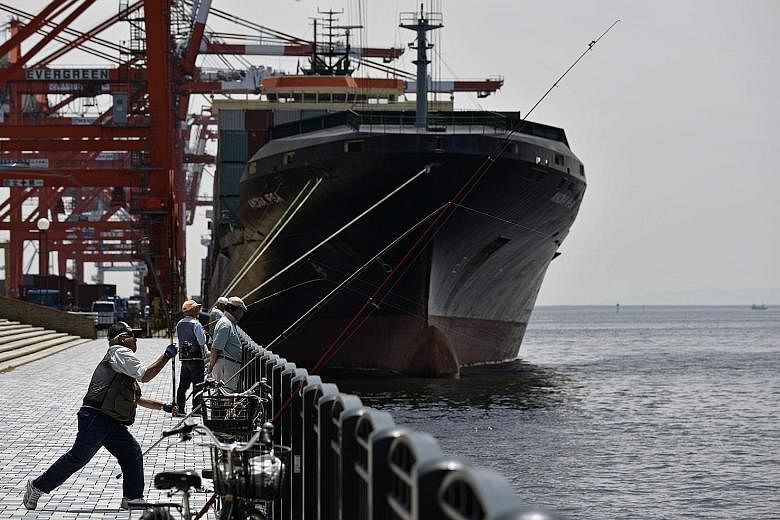TOKYO • Japan's exports fell sharply in April and manufacturing activity suffered the fastest contraction since Prime Minister Shinzo Abe swept to power in late 2012, providing further evidence that the premier's Abenomics stimulus policy is struggling for traction.
The bleak readings on the health of the world's third-largest economy follow Japan's failure last week to win support from its global counterparts to weaken the strong yen, which Tokyo fears could do further damage to the sputtering economy.
They also add pressure on both Mr Abe and the Bank of Japan to do more to rev up flagging growth, even as economists and global investors worry that central banks may be reaching their limits with radical experiments that have yet to kick-start growth.
Data on Monday showed Japan's exports fell 10.1 per cent in April from a year earlier, the fastest decline in three months, as a stronger yen and weakness in China and other emerging markets take their toll on the country's shipments.
Imports shrank more than 23 per cent, reflecting not only lower commodity prices but stubbornly weak domestic demand that has defied a massive asset-buying programme by the BOJ, which is now into its fourth year.
The decline was likely exaggerated by a drop in United States-bound car exports due to supply-chain disruptions caused by earthquakes in Japan last month, but a firmer yen and lacklustre global demand are clouding the outlook for this year.
Some analysts fear the economy could contract this quarter after dodging a return to recession early in the year.
"Drops in US-bound car exports were noise," said Mr Takeshi Minami, chief economist at Norinchukin Research Institute.
"Asia and the global economy remain weak. On top of that, yen gains squeeze profits at exporters, causing wages and capital spending to weaken, which would hamper Abenomics' aim of creating virtuous growth," Mr Minami said.
Japanese officials recently threatened to intervene in foreign exchange markets to halt "disorderly, one-sided" moves as the yen bolted to 18-month highs.
However, the US issued a fresh warning to Tokyo on Saturday against weakening its currency, overshadowing a Group of 7 finance leaders' gathering to discuss how to revive growth.
Bank of Japan deputy governor Hiroshi Nakaso, while declining to comment on how a strong yen could affect its policy decisions, said yesterday it was desirable for currency rates to move in a stable manner, reflecting economic fundamentals. "The desirability of exchange rate stability is widely shared by the Japanese industry," he said at a seminar.
Exports to China - Japan's largest trading partner - fell 7.6 per cent last month, while US-bound shipments fell 11.8 per cent year-on-year.
Car exports to the US fell 4.4 per cent, down for the first time since November 2014.
Exports to Asia, which account for more than half of Japan's shipments, fell 11.1 per cent in the year to April, but EU-bound shipments rose 9.9 per cent.
REUTERS

